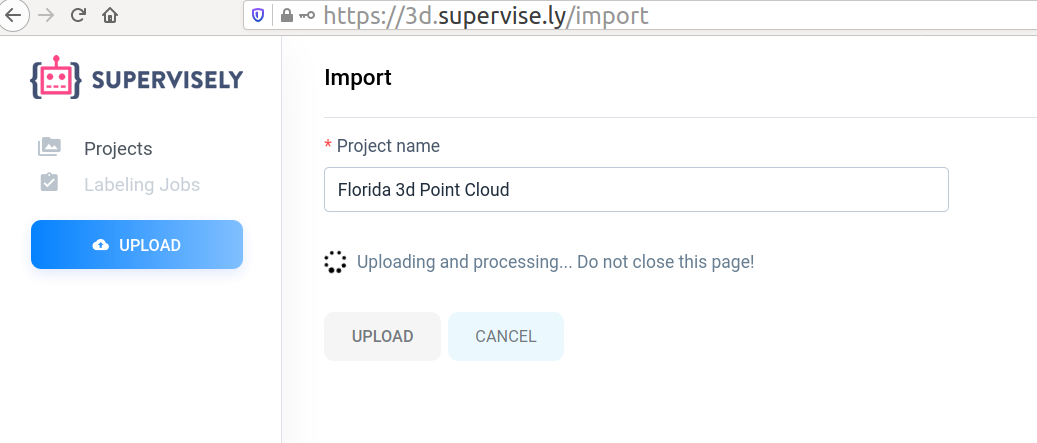To install the packages we need to the lidar data exploration and ML training, it is only needed to install the requirements.txt file by typing in the terminal:
pip3 install -r requirements.txt
# Install PCLPY
conda install -c conda-forge -c davidcaron pclpy
# install PCL
sudo apt-get update -y
sudo apt-get install libpcl-dev -y
# conda install -c sirokujira pcl --channel conda-forge UNINSTALLED
# conda install -c sirokujira python-pcl --channel conda-forge WAS NEVER INSTALLEDPython-pcl works only with Python2.7, Python3.5 and Python3.6. I use Python3.8 so a virtual environment which runs python3.6 needs to be installed and used.
# Install Python3.6
sudo add-apt-repository ppa:deadsnakes/ppa
sudo apt-get update
sudo apt-get install python3.6
sudo apt autoremove
# Install virtual environment
sudo apt-get update
sudo apt-get install python3-virtualenv
# Create Python3.6 virtual environment called LIDAR
virtualenv -p /usr/bin/python3.6 lidar
# Work on this virtual environment
source lidar/bin/activate
# check the python version to verify that it is Python3.6
python --versionError: when trying to import pcl in Python3.6, the following error occurs: ImportError: libpcl_keypoints.so.1.7: cannot open shared object file: No such file or directory
a. Tried
Installing pcl v0.3.0rc1 from source works around this issue with libpcl_keypoints.so.1.7 on Ubuntu 18.04. Let's do this then
-
Download
python-pcl-0.3.0a1.tar.gzfrom source - here -
Unpack and install
tar zxf python-pcl-0.3.0a1.tar.gz
cd python-pcl-0.3.0a1
python setup.py install
> running install
> running egg_info
> writing python_pcl.egg-info/PKG-INFO
> writing dependency_links to python_pcl.egg-info/dependency_links.txt
> writing requirements to python_pcl.egg-info/requires.txt
> writing top-level names to python_pcl.egg-info/top_level.txt
> reading manifest file 'python_pcl.egg-info/SOURCES.txt'
> writing manifest file 'python_pcl.egg-info/SOURCES.txt'
> installing library code to build/bdist.linux-x86_64/egg
> running install_lib
> running build_py
> running build_ext
> cythoning pcl/_pcl_180.pyx to pcl/_pcl_180.cpp
> error: /home/path/python-pcl-0.3.0a1/pcl/_pcl_180.pyx
Tried
Python-pcl works with libpcl_keypoints.so.1.7 however Ubuntu installs the latest version of it which currently is libpcl_keypoints.so.1.8.
Installing libpcl_keypoints.so.1.7 downloaded as .deb from here
sudo apt remove libpcl-dev # to remove installed version 1.8
# checked the installed version
sudo apt list libpcl-dev
> libpcl-dev/bionic-updates 1.8.1+dfsg1-2ubuntu2.18.04.1 amd64
> N: There is 1 additional version. Please use the '-a' switch to see itIn order to add libpcl_keypoints.so.1.7 I needed to update the source.list of Ubuntu 18.04 (
Ubuntu 16.04 source.list ) and install I read this here:
sudo apt-get install libogdi-dev libhdf5-openmpi-dev python-mpi4py libgdal-dev libhdf5-mpi-dev python-vtk6 libhdf5-openmpi-100 libvtk6.3 libvtk6.3-qt libvtk6-qt-dev libvtk6-dev libboost-all-dev libogdi3.2 libopenmpi1.10 libgdal1i libgdal.so.1-1.11.3 libvtk6.2 libpcl-visualization1.7 libpcl-surface1.7 libpcl-io1.7 libpcl-apps1.7 libpcl1.7 libpcl-dev=1.7.2-14build1 --fix-broken
if these do not work, I need to reverse the changes!
Test that python-pcl has been installed successfully:
python3
> https://vtk.org/download/ https://discourse.vtk.org/t/installing-vtk-in-ubuntu-18-04/2147/3
On Ubuntu
Using the displaz library.
To start displaz, type in the terminal the following independent of the folder in which you are right now:
displazsudo apt-get install pcl-tools
pcl_viewer multiview 1 ./path_to.pcd Supervise.ly is an online tool that has been developed to label data for Machine Learning applications.
Luckily, they recently released their support for labelling 3D Point Cloud Data - link here. We will use this tool to label the data using their graphical interface to prepare it for the machine learning job. Here is a Medium blog post explaining how the labelling interface works.
It is needed to create an account in order to use Supervise.ly.
Supervise.ly allows for 2 types of lidar data files to be uploaded to their platform: .pcd and .kitti. I have chosen to convert the .las file we have into a .pcd file.
Note PDAL failed to correctly convert the files. The resulting .pcd file has 0 point cloud points and no header. Will try converting using open3d - which is a Python library.
Current Setup Operating System: Ubuntu 18.04
Needed Package PDAL
PDAL Installation Instructions here
sudo apt-get update -y
sudo apt-get install -y pdal File Convertion Instructions here
pdal translate input.las output.pcdWhen this is finished, please upload the .pcd file to Supervise.ly and start labelling.

Installation Instructions
-
Link with these instructoins here.
-
PCL installation instructions here
-
PCLPY installation instructions here and here on Github
Python Packages
- Las2Pcd Github Page here
sudo aptitude install libpcl-dev -y pip3 install python-pcl
Error: ImportError: libpcl_surface.so.1.7: cannot open shared object file: No such file or directory
sudo aptitude install libpcl-dev=1.7.2-14build1
download python-pcl tar.gz from there: https://github.com/strawlab/python-pcl/archive/v0.3.0rc1.tar.gz
image from GIMP
sudo aptitude install libpcl-dev=1.7.2-14build1
sudo apt install pcl-tools
sudo apt-get update -y
sudo apt-get install -y cython
pip3 install cython
pip3 install numpy
sudo apt-get install libpq-dev python3-dev build-essential libxml2-dev libxslt1-dev libldap2-dev libsasl2-dev libffi-dev
>>>>>>>
>python3 setup.py install
>setup.py: error: cannot find PCL, tried
> pkg-config pcl_common-1.8
> pkg-config pcl_common-1.7
> pkg-config pcl_common-1.6
> pkg-config pcl_common
# check all libraries installed
pkg-config --list-allhttps://github.com/PointCloudLibrary/pcl/archive/pcl-1.11.1.tar.gz & how to compile: https://pcl-tutorials.readthedocs.io/en/latest/compiling_pcl_posix.html
metslib
# install instructions here: https://kezunlin.me/post/137aa5fc/
wget https://www.coin-or.org/download/source/metslib/metslib-0.5.3.tgz
tar xzvf metslib-0.5.3.tgz
cd metslib-0.5.3
./configure
make
sudo make installgit clone https://gitlab.kitware.com/vtk/vtk.git
mkdir VTK-build # this is at the same level as the vtk git repo dir - not a child of it!!
cd VTK-build
cmake -DCMAKE_BUILD_TYPE:STRING=Release ../vtk/
# update cmake # download page: https://cmake.org/download/
wget https://github.com/Kitware/CMake/releases/download/v3.18.2/cmake-3.18.2.tar.gz
tar xvf cmake-3.18.2.tar.gz
cd cmake-3.18.2
./configure
make
sudo make install
sudo ln -s /usr/local/bin/cmake /usr/bin # so that cmake --version can find cname in /usr/bin/cmake
# get Q5 https://vtk.org/Wiki/VTK/Building/Linux
wget http://download.qt-project.org/official_releases/qt/5.15/5.15.1/single/qt-everywhere-src-5.15.1.tar.xz
tar -xf qt-everywhere-src-5.15.1.tar.xz
cd qt-everywhere-src-5.15.1
./configure
make -j2
sudo make install
FINISHED HERE... STILL TASKS TO DO...sudo apt-get install libeigen3-dev
tar xvf pcl-pcl-1.11.1.tar.gz
cd pcl-pcl-1.11.1 && mkdir build && cd build
cmake .. -DCMAKE_BUILD_TYPE=Release -DBUILD_visualization=ON #cmake .. NEED TO INSTALL VTK FOR VISUALIZATION
# -- Could NOT find Pcap (missing: PCAP_LIBRARIES PCAP_INCLUDE_DIRS)
# Could not find a package configuration file provided by "VTK" with any of
# the following names:
# VTKConfig.cmake
# vtk-config.cmake
make -j2
sudo make -j2 install
> successfully installed.conda install -c sirokujira python-pcl --channel conda-forgeUnsatisfiableError: The following specifications were found to be incompatible with the existing python installation in your environment:
Specifications:
- python-pcl -> python[version='>=2.7,<2.8.0a0|>=3.6,<3.7.0a0|>=3.5,<3.6.0a0']
Your python: python=3.8
